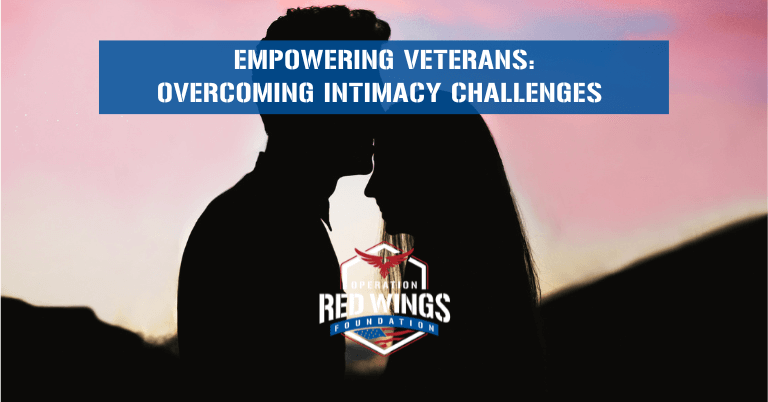In the journey from military to civilian life, Veterans face a myriad of unique challenges, among which issues of intimacy often emerge. These challenges are not just personal but also relational, affecting connections with non-service member partners. Factors like the side effects of necessary medications and the lasting impact of traumatic experiences can significantly influence intimate relationships. This blog aims to shed light on these challenges and offer practical tools and strategies to help Veterans navigate the complexities of intimacy with strength and resilience.
Challenges Faced by Veterans: Medications and Trauma:
For many Veterans, medications are vital in managing physical injuries and psychological conditions stemming from their service. However, these medications can have side effects that impact sexual health and intimate relationships. Additionally, mental health challenges like post-traumatic stress disorder (PTSD), anxiety, depression, and mood disorders can create barriers to emotional and physical intimacy. The interplay between mental health, medication, and intimacy can be complex, requiring a nuanced understanding and approach.
Medications and Their Impact:
Medications prescribed for physical and mental health conditions can inadvertently affect libido, sexual performance, and overall desire for intimacy. For instance, certain antidepressants and blood pressure medications are known to have side effects that can diminish sexual desire or performance. Understanding these side effects and discussing them openly with healthcare providers is crucial for veterans seeking to maintain healthy intimate relationships.
Addressing the Echoes of Trauma:
Trauma, especially PTSD, can significantly impact a veteran’s ability to engage intimately. Flashbacks, anxiety, and emotional detachment, common symptoms of PTSD, can disrupt the natural flow of intimate relationships. It’s important to recognize these symptoms not as personal failings but as treatable psychological responses to past traumatic events.
Tools for Improving Intimacy:
1. Open Communication:
The cornerstone of any thriving relationship, especially for Veterans, lies in open and honest communication. Regular check-ins to express feelings, fears, and desires can strengthen the bond between partners. These check-ins can take various forms, from daily texts or calls to in-depth conversations. Encouraging a culture of openness and vulnerability allows for a deeper understanding and connection.
Effective communication goes beyond just talking; it involves active listening, empathy, and the willingness to be vulnerable. Techniques such as reflective listening, where partners repeat back what they’ve heard to confirm understanding, can be incredibly beneficial. It’s also essential to create a safe space where both partners feel comfortable sharing their deepest concerns and desires without fear of judgment.
2. Professional Counseling:
Professional counseling can be a transformative tool for Veterans struggling with intimacy issues. This might involve individual therapy to address personal traumas or couples counseling to work on relationship dynamics. Seeing a therapist should be viewed as a sign of strength and a proactive step towards healing and enhancing relationship quality. Therapists and counselors can offer a range of therapies tailored to the needs of Veterans and their partners. From cognitive-behavioral therapy (CBT) to address negative thought patterns to specialized trauma therapies like A.R.T (Accelerated Resolution Therapy), these professionals provide valuable guidance and support.
3. Medication Review with Healthcare Providers:
Regular discussions with healthcare providers about the impact of medications on intimate life are essential. These conversations can explore options like adjusting dosages, changing medications, or incorporating treatments like hormone therapy to mitigate negative side effects on sexual health.
In some cases, alternative treatments such as acupuncture, herbal remedies, or nutritional adjustments can complement or replace traditional medications, potentially reducing side effects related to sexual health.
4. Couples Therapy:
Couples therapy offers a structured environment for both partners to explore intimacy issues together. This therapy fosters understanding, improves communication, and helps address emotional disconnects that might be affecting their intimate life.
In couples therapy, partners learn to navigate their differences, understand each other’s perspectives, and work together towards common goals. This process can help rebuild trust, enhance emotional connection, and improve the overall quality of the relationship.
5. Mindfulness and Relaxation Techniques:
Mindfulness and relaxation techniques can be particularly beneficial for Veterans dealing with anxiety and stress. Practices like deep breathing, guided meditation, and yoga can help in creating a calm and relaxed state of mind, conducive to intimacy.
Mindfulness practices encourage living in the present moment and can be especially helpful in managing intrusive thoughts or flashbacks related to trauma. These techniques can also enhance emotional connection between partners by fostering a sense of peace and presence during intimate moments.
6. Operation Red Wings Foundation Couples Retreats:
Operation Red Wings Foundation offers tailored six-day couples retreats that include various tools such as trauma-informed yoga, Accelerated Resolution Therapy, therapeutic horsemanship and more. These retreats are designed to address the unique needs of Veterans and their partners, focusing on building intimacy and understanding within the relationship.
In the end, navigating intimacy challenges as a Veteran involves recognizing the multifaceted nature of these issues and adopting a proactive, compassionate approach. By understanding the impact of medications and trauma, engaging in open communication, seeking professional guidance, and utilizing available tools and resources, Veterans and their partners can strengthen their relationships. The journey to enhancing intimacy may be challenging, but with patience, understanding, and the right strategies, it is a path that leads to deeper connection and fulfillment.
Subscribe to the ORWF Newsletter






